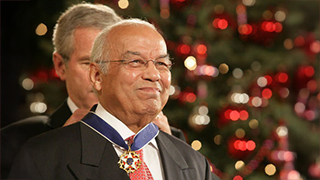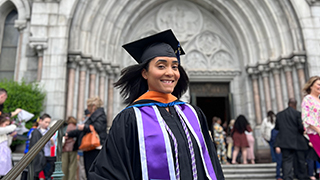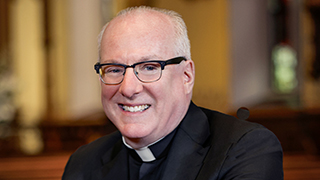Seton Hall Biology Professor Dr. Nichols and Student Swagath Thomas Awarded STEM Undergraduate Research Award
Tuesday, March 26, 2024
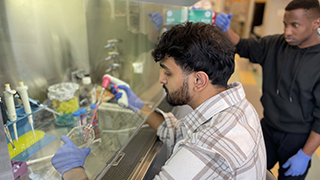
Students Swagath Thomas and David Essien pictured in the Laboratory
In January of 2024, Seton Hall Professor Daniel B. Nichols, Ph.D. and Biology Major Swagath Thomas were awarded a competitive STEM Undergraduate Research Award for their study, “Molluscum Contagium Virus Immune Evasion Strategies.” Molluscum Contagium is a skin virus that transmits from skin-to-skin contact and presents as little bumps on the skin. Nichols and Swagath are researching how the virus lives and hides. Through their research, Nichols and Swagath have observed that even though a person may have healed from the virus, the small bumps will still appear on the skin for up to months at a time.
Their research involves observing proteins that are made in the context of viral infections and investigating viral proteins that can block infections. Nichols says “a lot can be learned by seeing how host cells react to viral infections as well as learning a lot about cellular biology and immunology.”
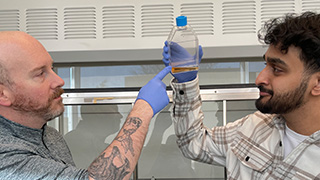
Professor Nichols and Swagath Thomas pictured in the Laboratory
The research that Nichols is conducting with Swagath can lead to other scientific discoveries, and Nichols has truly enjoyed mentoring Swagath throughout this process and wants to make sure that students feel supported to accomplish their goals. Working alongside a respected expert in their field of study can serve as a stepping-stool for students who want to continue pursuing research as a career or in graduate school. Students learn first-hand laboratory skills and, more importantly, get to think scientifically about real, original experiments. During their time together, Nichols has observed Swagath being “a very smart and independent student. Not only is he able to learn very quickly, but he is also a good leader in the lab.”.
Likewise, Swagath appreciates that this award has allowed him to spend the majority of his time in the lab learning from Nichols. “Dr. Nichols is a great mentor to have,” he exclaims, “especially for research.” This award provides a budget for research supplies as well as a stipend that affords students the opportunity to spend a few days of the week throughout the spring and summer in the lab learning, rather than working full time. “Collaborating on pioneering research alongside a faculty member stands out among the most transformative experiences students can enjoy,” explains Jonathan Farina, Ph.D., interim dean of the College of Arts and Sciences. “Few experiences are as transformative and as impactful on student learning. I am proud that this award has enabled 18 of our students to benefit from it, regardless of their financial circumstances.” At the conclusion of their research, Swagath hopes to publish their findings, present them at next year’s Petersheim Academic Exposition, and present the results at the American Society of Virology conference as well.
Seton Hall has a robust Department of Biological Sciences with a wide range of faculty researching in microbiology, virology, immunology and other areas. The Department offers both master and doctoral degrees, and Seton Hall is looking to launch a new 3+2 B.S./ M.S. Program that will enable students to earn a B.S. in Biological Sciences and an M.S. in Molecular Bioscience in just five years.
Students interested in STEM research should contact Associate Dean Mitra Feizabadi (mitra.shojania-feizabadi@shu.edu) and students interested in STEM graduate programs should contact Associate Dean Michael Dooney (michael.dooney@shu.edu).
Categories: Arts and Culture, Health and Medicine, Science and Technology




